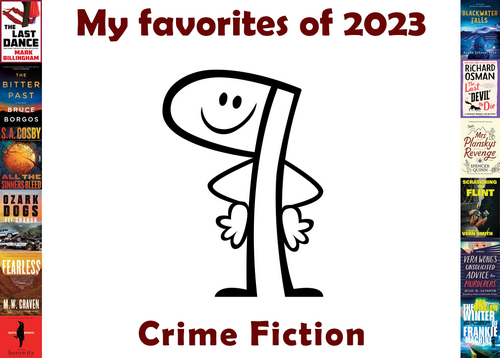
Finally, we’re at the end of my 2023 wrap-up. Thanks for sticking with me for so long! (assuming you have). I read 90 books I put in the category of “Mystery/Detective Fiction/Crime Fiction/Thriller” last year (and there are a couple of multi-genre novels that could beef that number up a bit), 30% of my reading last year. So I have to consider it apart from everything else when I put together my Favorites Lists, or just about everything else would get ignored. Even if I went with a Top 20 instead of a Favorite 10, maybe 2-3 books from the previous lists would’ve made it along with all of these.
I couldn’t whittle this list down further than 12. But since a couple of my lists last week were under 10, I figure that I’ve got a slot or two to spare. Once again, I’ll note that I limit my lists to things I read for the first time. Yes, there are some names on here that have been on a couple of these lately. And it wouldn’t surprise me to see some of these new names show up from time to time in the years to come.
(in alphabetical order by author)
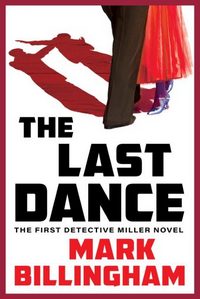 The Last Dance
The Last Dance
I really wish I had a post up about this book to pilfer from here. Detective Miller comes back to work after the murder of his wife to investigate a pair of murders. There’s no clear—rather, easily discoverable—connection between the two deaths other than proximity and coincidence. Neither explanation is good enough for the police. Miller has to adjust to a new partner, who really doesn’t understand (or appreciate) his eccentricities, his sense of humor, or undisguised antagonism toward their boss. The only thing more appealing to the twisty, multi-layered, mystery in this novel is Miller himself. His sense of humor, his questionable grasp of reality, and his unconventional approach to this (and presumably other) investigations are going to win several fans. This is the first Billingham novel I’ve read (after years of meaning to try), it will not be the last.

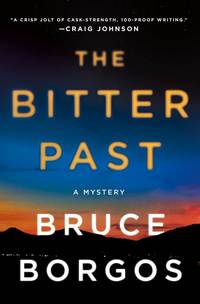 The Bitter Past
The Bitter Past
by Bruce Borgos
My original post
A great mix of Cold War espionage and modern-day Police Procedural, with a Western twist. Borgos assembled a cast of characters that leap off the page, I felt like I’d been reading about Porter Beck and his deputies for years within just a chapter or two. There’s blood, intrigue, nuclear fall-out, wit, humor, a grisly opening, and a dramatic conclusion—and a whole lot of other stuff along the way. I don’t know if Borgos can do something just like this novel book again, but as long as Porter Beck and his team are around for whatever’s next, I want to see it.

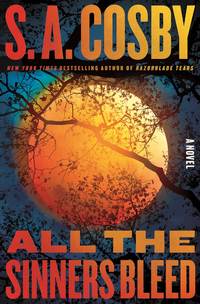 All the Sinners Bleed
All the Sinners Bleed
by S. A. Cosby
My original post
As the first black Sheriff of Charon County, Virginia, Titus Crown has a lot on his plate. He has to watch his every step to keep the political and social leaders of the small community from removing him from office while holding off demands from the local social activists to turn the tables on behalf of the over-policed minorities and give the white community a taste of that treatment. It’s not going well for him—one horrible day finds Titus investigating a terrible crime and uncovering something that nightmares are made of—serial killers working undetected in Charon County for years. Can Titus stop the killing while keeping Charon County from tearing itself apart?
Sparse, but rich, prose that further disproves the notion that genre can’t be the home of good writing. Cosby tackles hard issues—but really doesn’t try to solve them—he merely puts them on display for readers to acknowledge and wrestle with. It’s also just a cracking thriller that could be read as shallowly as you want and would keep you white-knuckled and racing to the final confrontation. Cosby’s one of the best in action now, and this solidifies that reputation.

 Ozark Dogs
Ozark Dogs
by Eli Cranor
My original post
Like the above, this can be read as a white-knuckle thriller, but it’s more. This is a revenge story, with almost no one involved really understanding what the instigating event really was or meant (this doesn’t stop anyone seeking vengeance, naturally). This is a book about consequences, the sins of the past being visited on the present, and about the price of devotion (to a person, idea, etc.). It’ll knock you out.

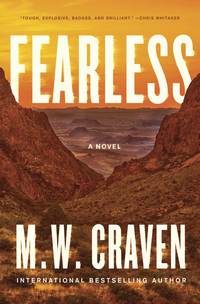 Fearless
Fearless
by M.W. Craven
My original post
Craven’s new series, featuring a U.S. Marshall who is incapable of feeling fear, is off to a dynamite start. This book just worked on every level—Koenig is a fertile character, well-designed to carry a series for quite a while. His assets are perfect for a Reacher/Peter Ash-type character. His flaws keep him from being invincible, and provide plenty of ways for him to be his own greatest adversary. His quirks (e.g., fixation on chocolate milkshakes, absorption of odd bits of trivia) round him out nicely. The reason he’s off the grid is better than being a Luddite/technophobe. Can he grow—and can the reader grow in their understanding of him? Sure. He can also believably regress and find develop new hindrances and weaknesses to work through or overcome. The action scenes were almost impossibly good.

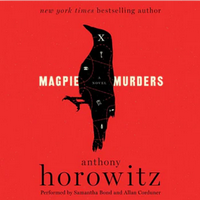 Magpie Murders
Magpie Murders
by Anthony Horowitz, narrated by Samantha Bond, Allan Corduner
The death of a hugely best-selling author sends his editor on a hunt for the missing final pages to his final book. Alternatively, if she can figure out who the killer in the book was, they can at least salvage the book. But while she’s at it, she starts to think the author was murdered and maybe she can figure that out, too. A fictional murder and a real life one, that’s a pretty big task for an amatuer sleuth. What a fantastic book! The concept was great, the hook was gripping, the execution was dynamite, the narration was spot-on, the….the…ugh. I’m just listing superlatives at this point. Which is pretty much why I haven’t finished my post about it (despite starting 11 months ago)—words fail me. Just loved this.

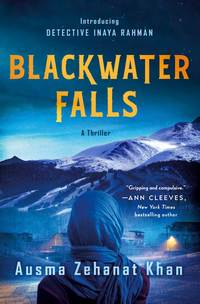 Blackwater Falls
Blackwater Falls
My original post
A probable racially and religiously motivated murder threatens to push heightened tensions over the edge between immigrant communities and local law enforcement. Enter the Community Response Unit—to hold the police accountable (if necessary), diffuse the situation (if at all possible), and get the answers everyone wants. Khan balances the social, personal, and investigative aspects of this novel with the skill of a seasoned professional. This is a great procedural in the way it embraces the defining traits and pushes them in new ways, it’s a great character study, a good commentary on several issues facing the country—and it’s a pretty solid mystery, too (can’t forget that).

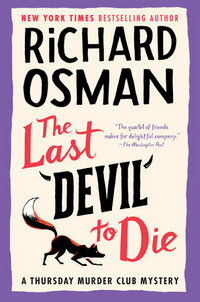 The Last Devil to Die
The Last Devil to Die
My original post
Anyone who’s read me over the last couple of years had to expect that Osman would show up in this list—and here he is. The latest in the Thursday Murder Club series demonstrates all of the strengths of the previous novels at the same time—the humor, the heart, the cleverness of the characters, a twisty investigation, and humanity at its worst and best.

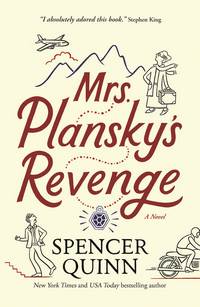 Mrs. Plansky’s Revenge
Mrs. Plansky’s Revenge
My original post
I’m a huge fan of Quinn’s long-running series, but every time he steps away for a stand-alone, I find myself increasingly impressed with him. This is an implausible, but great story about an elderly woman who is duped by a Bail Scam, losing almost everything. But she has enough money—and more than enough nerve and moxie to fly to Romania to try and find the scammers and get her money back. It’s a revenge fantasy that many people will have had, taken on by a relatable character that you can’t help but root for. There’s plenty of heart to go around, and it’ll just leave you feeling good (as long as you don’t put it down while she’s being ripped off).

 Scratching the Flint
Scratching the Flint
by Vern Smith
My original post
This is a gritty novel exploring the “the lowest common denominators of policing.” Our protagonists are detectives who seem intent on making their cases, on making arrests. But when push comes to shove, I’m not entirely convinced it’s about enforcing the law all the time with them—it’s getting a win, coming out on top over some of them. Taking place in early 2001, this book evokes the feel of the time—the sentiments toward reform in policing as well as in the treatment of women and minorities are clearly of their time (they’re also pretty relevant today, but we’d discuss them a little differently). This is a visceral, powerhouse read that will stay with you.

 Vera Wong’s Unsolicited Advice for Murderers
Vera Wong’s Unsolicited Advice for Murderers
My original post
I need to think about this book a little to wash away the feeling of revisiting the last one off of me. There’s just so much to commend about this book—and so little to quibble with—that I still get excited about it months later. Vera Wong, the proprietor of a little-visited tea shop finds a dead man on her floor one day. Desperate for a change of pace, she decides that she’ll “help” the police with their investigation—eventually starting her own. How hard can it be? She’s watched plenty of procedurals, is smart, and (unlike Sherlock Holmes) is a suspicious Chinese mother. The murderer doesn’t stand a chance.
But then she turns her lead suspects into a found family of sorts. You don’t want any of these suspects to be guilty because the victim was a horrible guy and you want the suspects to become your new best friends. There’s a lot of sunshine and rainbows throughout this book, offsetting the murder, other crimes, loneliness, and despair. The murder mystery at the core of the novel is clever enough and worth the time—but this found family and the growth prompted in each member of it (including Vera) is what will make you a fan of it.

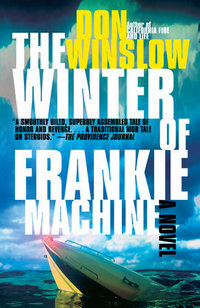 The Winter of Frankie Machine
The Winter of Frankie Machine
by Don Winslow
This is typical Winslow—stylish, winning, clever, and frequently violent. Frankie Machine is a retired hitman who finds himself as the target for a new generation of hitmen over something that happened years before. Frankie Machianno has to put his businesses on hold and return to his old life to keep his family safe—and to keep himself alive—while finding out exactly why someone wants him dead and convincing them (using whatever necessary means) to leave them all alone once and for all. It’s such a strong, fast-moving, ride that the pages melt away while you read.

![]()



